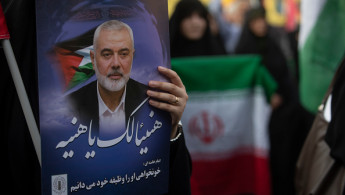Putin asks Iran to avoid civilian casualties in Israel response, sources say
Russian President Vladimir Putin has asked Iran's Supreme leader Ayatollah Ali Khamenei for a restrained response to Israel's suspected killing of the leader of Hamas, advising against attacks on Israeli civilians, two senior Iranian sources said.
The message, according to the sources, was delivered on Monday by Sergei Shoigu, a senior ally of the Kremlin leader, in meetings with top Iranian officials as the Islamic Republic weighs its response to the assassination of Ismail Haniyeh.
Tehran also pressed Moscow for the delivery of Russian made Sukhoi Su-35 fighter jets, the two Iranian sources, privy to the meeting in Tehran, the sources told Reuters.
In Moscow, the Kremlin did not respond to a request for comment. State-run RIA news agency reported on Tuesday that Shoigu said he discussed Haniyeh's killing on his Tehran visit.
The two sources with knowledge of the matter did not provide further details on the talks with Shoigu, who was defence minister before becoming the secretary of Russia's security council in May.
They said Shoigu's visit was one of several avenues Moscow had used to relay to Iran the need for restraint while at the same time condemning Haniyeh's killing as "a very dangerous assassination", in a bid to prevent a Middle East war.
The Middle East, the sources said, was on the brink of a major war and those behind the assassination were clearly trying to trigger such a conflict.
Russia has cultivated closer ties with Iran since the start of its war with Ukraine and has said it is preparing to sign a wide-ranging cooperation agreement with Tehran.
There was no immediate comment from Iran's Foreign ministry. On Monday it said Tehran did not seek to raise regional tensions but needed to punish Israel to prevent further instability.
Diplomacy no longer an option
In Washington, an official from the Biden administration warned on Monday of the risks of a major regional conflict. The official, who spoke on condition of anonymity, emphasized that the scale of Iran's and Hezbollah's response would be a key factor in determining the extent of a potential conflict.
Despite efforts by Western and regional states to persuade Iran to retaliate in a measured way, or not at all, Tehran has told foreign officials it will respond "severely" to the killing of Haniyeh in Tehran, where he attended President Masoud Pezeshkian's inauguration, four Iranian sources independently confirmed.
In Lebanon, a prominent Lebanese source close to Hezbollah said "a retaliatory strike is inevitable and diplomacy is no longer a viable option", adding Iran wants the strike to be "severe" but not lead to a regional war. However, he said, this does not rule out the possibility of a war in Lebanon between Iran-backed Hezbollah and Israel.
A Middle East-focused senior US official said Washington was doing all it can "to dissuade all parties from going to a place they can’t get back from," stressing that other states in the region and Europe should do more. A Qatari official said Doha was in constant discussion with Iran to lessen tensions.
Israeli Defence Minister Yoav Gallant warned on Monday that Israel must be prepared for anything, including a swift transition to offense.
The country's response to any attack by Hezbollah or Iran would likely depend more on the damage caused rather than the scale of the attack, according to two sources familiar with recent Israeli assessments.
Israeli officials have not claimed responsibility for the killing. Iran backs Hamas, which is at war with Israel in Gaza, and also Hezbollah, with whom Israel has been trading fire since Hamas attacked Israel on Oct. 7 and ignited the Gaza conflict.
(Reuters)





 Follow the Middle East's top stories in English at The New Arab on Google News
Follow the Middle East's top stories in English at The New Arab on Google News


